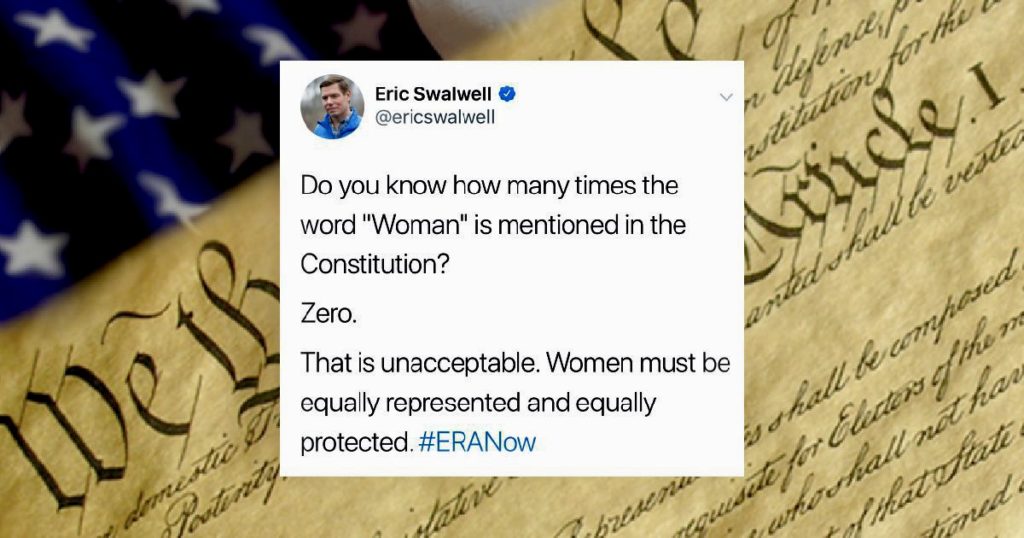“Do you know how many times the word “Woman” is mentioned in the Constitution?
Zero.
That is unacceptable. Women must be equally represented and equally protected. #ERANow”
–Eric Swalwell
Do you know how many times the word "Woman" is mentioned in the Constitution?
Zero.
That is unacceptable. Women must be equally represented and equally protected. #ERANow
— Eric Swalwell (@ericswalwell) May 1, 2019
Yes, I know how many times the word “Woman” is mentioned in the Constitution. It’s equal to the amount of times “Man” is mentioned.
Just for keeping track’s sake:
Number of times the word “Woman” is mentioned in the Constitution: Zero.
Number of times the word “Man” is mentioned in the Constitution: Zero.
Number of times the word “Person” is mentioned in the Constitution: Fifty-two.
Number of times the word “Citizen” is mentioned in the Constitution: Twenty-four.
What may be most surprising about the lack of the word “Woman” in the Constitution is that it doesn’t even appear in the 19th Amendment, which states
“The right of citizens of the United States to vote shall not be denied or abridged by the United States or by any State on account of sex.”
Number of times the word “sex” is mentioned in the Constitution: Just the one.
When it comes to “equality” of the sexes, it doesn’t get much more equal than that. The Constitution relied on “Person” and “Citizen” when discussing individuals long before pronouns were fragile things to be treated delicately, and at a time when “man”, “men”, or “mankind” could refer to all human beings. The Constitution never prevented women from voting, it merely left requirements for voting up to the states until it stepped in at the beginning of the roaring twenties.
As such, I don’t know what Swalwell finds “unacceptable” about the document being silent on sex right up until the point that it mandated certain protections under the women’s suffrage movement.
The one exception to the distinction is the fourteenth amendment, but that is through omission. It penalized states which denied the vote to freed male slaves, but remained silent on states which denied the vote to women. As such, between 1868-1920, it made a distinction in constitutional law between man and woman on the specific issue of voting, but that’s far less than the kind of discrimination that culture, society, and the states engaged in within that same fifty-ish years.
By contrast, women got the right to vote in 1940 in Quebec, and they couldn’t vote in national Mexican elections until 1953.
As far as the equal representation that Swalwell is asking for in America? Given the context of voting being the one area the Constitution ever made a sex distinction over, I’ll assume that’s where his focus is. And the fact is, American women are more likely to vote than American men by roughly five points. I’ll also assume he’s not sexist enough to believe that women can only be represented by other women. But the number of women legislators, though not equal to male legislators, is growing rapidly as more women choose to pursue public office.
There are various types of proposed text for an Equal Rights Amendment, so exactly what he’s calling for isn’t clear by the tweet alone. However, his implication that the American Constitution is somehow sexist for not using gendered language is absurd. Neutral language is exactly what many in the modern movements which aim to advance concepts like feminism or transgender rights specifically call for as the respectful default.

